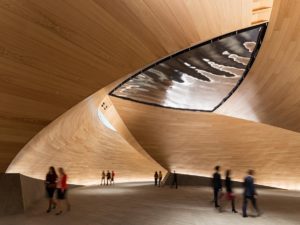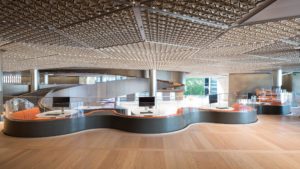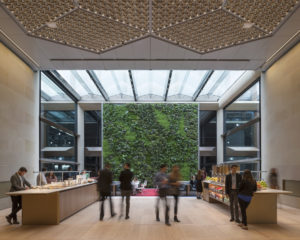I was very interested to learn the following about red oak from our sister organization, the American Hardwood Export Council:
The European market must, till now, have been something of a frustration for U.S. red oak suppliers. The species is America’s most prolific hardwood, so, in those terms, its most sustainable. In the U.S. itself it’s used extensively in a huge range of construction, interiors, and manufacturing applications, while other markets, such as China and Japan, also can’t get enough. But in Europe red oak has lagged some way behind its ubiquitous U.S. white cousin in popularity.
The article goes on to note that American red oak has needed a major showcase project in Europe to demonstrate its aesthetic and performance appeal. Well, now it has one in London: the brand new 1.1-million-square-foot European Headquarters of global financial-data giant Bloomberg. Designed by architect Norman Foster, the building’s stunning interiors make extensive use of American red oak—almost 400,000 square feet for the floors alone—not only for aesthetic reasons but also to achieve wellbeing and environmental goals. Here’s a look at some of those oak-clad spaces.

The Vortex, the red-oak-paneled lobby of the new Bloomberg European Headquarters in London, features an overhead work by the installation artist Olafur Eliasson. Photograph by James Newton/Foster + Partners
The importance of American red oak to the headquarters’ interiors is made dramatically clear from the moment you enter the reception lobby. Dubbed the Vortex, it’s a swirling, double-height space featuring three enormous oak-clad shells that curve up and over arriving visitors like billowing sails. Integrated into the structure overhead is a site-specific work by Icelandic-Danish sculptor and installation artist Olafur Eliasson. Titled No future is possible without a past, the piece looks as if it’s made of some rippling liquid but is actually highly polished metal. The geometry of the oak panels risked reverberation, so the wood was micro-perforated by laser, making it absorbent of sound without affecting its appearance since the holes are so tiny.

The red-oak floorboards are stuck to a metal underfloor with a magnetic system developed for the building. Photograph by Nigel Young/Foster + Partners
CEO Michael Bloomberg wanted uncovered hardwood flooring, an unusual choice for modern office buildings because of footfall noise and the frequent need to access communication cabling and other systems beneath the boards. To overcome those technical and functional problems, Kingspan, the building systems and materials provider, devised a solution where individual red-oak floorboards can be lifted and refitted at will. “Each board has a magnetic strip running its length, which sticks it to the metal access floor below,” explains the project architect. “So you can sucker one up, lever up the surrounding boards then just drop them back into place.” This also eliminates creaking, while the sound of footsteps is deadened by an additional acoustic layer between the oak boards and the access floor. It’s also makes replacing any damaged boards simple.

The Pantry, a sixth-floor space where free coffee and snacks are available, features red-oak floors and counters, and a lush green wall. Photograph by Nigel Young/Foster + Partners
Reflecting the importance of sharing and collaboration to Bloomberg’s work ethos, at the heart of the building lies the Pantry, a double-height space on the sixth floor that everyone passes through, increasing the likelihood of chance meetings and informal discussions. Although free coffee and snacks are offered in this light-filled area—which, along with red-oak floors and counters, features a lush green wall and close-up views of neighboring St. Paul’s Cathedral—the headquarters are a “no-cafeteria zone” in an attempt to encourage its 4,000 workers to leave the building at lunchtime. As Michael Bloomberg told the Evening Standard, he wanted to avoid the “Google syndrome” seen in some tech firm offices where the free meals and facilities are so luxurious that employees become addicted to their work life. “We are going in the opposite direction to Google—we encourage people to go outside.”



